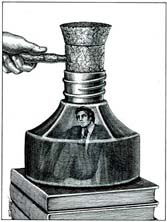
Dictionary.com offers this definition of a censor: "an official who examines books, plays, news reports, motion pictures, radio and television programs, letters, cablegrams, etc., for the purpose of suppressing parts deemed objectionable on moral, political, military, or other grounds." That "official" can be a head of state, like Putin, the head of a news operation, or even an individual reporter. Anyone who chooses to suppress a story or fails to investigate one because it does not conform to their worldview could be labeled a censor.
Which brings me to the Hunter Biden laptop story the "discovery" by The New York Times that his laptop and its contents are real, after all. Not only did the Times and other major and social media ignore the story, in some cases the story was deemed fraudulent and blocked on several platforms.
I think the more accurate explanation as to why the story was censored by these entities is that it was broken by The New York Post, which the mainstream media deem a "conservative" newspaper and by their standard, unreliable. The line favored by much of the suppression press was that the laptop story was Russian "disinformation."
The real unreliable purveyors of disinformation (or no information) are those who failed to do their journalistic duty and investigate. That the story was not followed up on during the 2020 presidential campaign adds to the suspicion, especially among many conservatives, that the information suppression was deliberate. NPR last year, "corrected an online article that falsely asserted that documents from first son Hunter Biden's laptop had been "discredited by U.S. intelligence." The correction came after the election. It took the Times and others until this year to fess up. According to the NY Post, 51 intelligence officers who signed a public letter claiming the laptop story was Russian disinformation have so far refused to apologize.
"Fact-checkers" published what they said were lies told by Donald Trump. The Washington Post calculated Trump had lied or uttered misleading statements 30,573 times during his four years in office. No such diligence has been conducted by the major media of Hunter Biden and his family's alleged business and personal relationships with nefarious individuals and corrupt governments.
For years the legacy media has seen itself as the only "legitimate" source of news. In a type of "if a tree falls in the woods and no one is around, does it still make a sound?" scenario, if The New York Times, The Washington Post, broadcast and some cable news networks don't report it, is it still news? Yes, it is and the source – whether it be The NY Post, UK Daily Mail, or talk radio — should not matter so long as the story can be independently verified.
That The New York Times failed to do so until now is a dereliction of newspaper's journalistic duty. Had the information been known before the election, it conceivably might have changed votes in some states where Joe Biden won by narrow margins.
The tardy tacit admission by the Times that the NY Post was right will add to the view of many that today's journalism is driven mostly by agendas and not facts and when information goes against the worldview of reporters and their bosses it is to be ignored.
(COMMENT, BELOW)
Cal Thomas, America's most-syndicated columnist, is the author of 10 books.


 Contact The Editor
Contact The Editor
 Articles By This Author
Articles By This Author